Mining Company Withdraws Application For Project Near Okefenokee Swamp, Vows To Resubmit

Twin Pines’ proposal to mine for titanium dioxide outside the Okefenokee National Wildlife Refuge caused an immediate outcry. The refuge covers nearly 630 square miles near the Georgia-Florida state line. Its tea-colored waters, cypress forests and flooded prairies draw an estimated 600,000 visitors each year.
Emma Hurt / WABE
An application to mine titanium near the Okefenokee Swamp in South Georgia has been withdrawn, and the mining company intends to submit a smaller one.
Steve Ingle, president of the mining company Twin Pines, said to be more conservative, “we have agreed with the U.S. Army Corps of Engineers to reduce the size of the permit area and resubmit new documentation for further review and evaluation as soon as possible.”
The original 12,000-acre proposal attracted protests from those concerned it would impact the swamp, which is a National Wildlife Refuge. It reminded opponents of a larger proposal to mine near the swamp, which was stopped by the federal government more than 20 years ago.
“We are in the process of developing the information to be included in the revised application and still intend to seek approval to move forward with the mining project in an environmentally responsible way and to providing good-paying jobs for the people of Charlton County,” Ingle said.
Billy Birdwell, a spokesman for the Army Corps of Engineers, which is responsible for granting this kind of permit, said this happens occasionally.
“While not a daily, weekly or even monthly occurrence, it happens often enough that we consider it routine,” he said.
Birdwell explained the Army Corps had informed Twin Pines the Corps was considering an environmental impact statement for the project, though it had not yet made a decision.
That’s a much more rigorous permitting process to determine how a project would affect its environment.
The national conservation group Defenders of Wildlife has advocated for the need for an environmental impact statement for the project.
Southeast Program Representative Christian Hunt said, “Further analysis will only reinforce what we’ve known all along: that mining poses an unacceptable threat to the Okefenokee.
“Twin Pines will no doubt return with a second application designed to skirt scientific scrutiny and further review. We will not be fooled by this strategy. The fight for Okefenokee is far from over, and we will not let our guard down.”
Charlton County Administrator Hampton Raulerson said the county considers the project “an excellent economic opportunity as long as it is environmentally feasible.
“We absolutely do not want something to harm the Okefenokee Swamp, but we also do not want to just outright turn down an opportunity that could be offered for our citizens to work at,” he said.
“If they can prove that it’s sustainable and that it’s not going to do the harm that people are saying it will, then we would like to see them come.”








